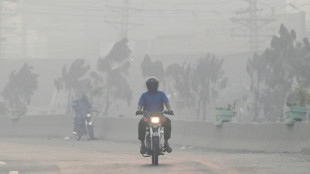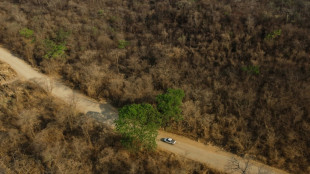
-
 US writes off over $1 billion of Somalia debt
US writes off over $1 billion of Somalia debt
-
Stock markets climb, dollar dips as US votes

-
 Boeing union approves contract, ending over 7-week strike
Boeing union approves contract, ending over 7-week strike
-
Stock markets rise, dollar falls as US votes

-
 US September trade deficit widest in over two years
US September trade deficit widest in over two years
-
'Black day': French workers protest Michelin plans to close two plants

-
 Saudi Aramco's quarterly profit drops 15% on low oil prices
Saudi Aramco's quarterly profit drops 15% on low oil prices
-
Spain unveils aid plan a week after catastrophic floods

-
 Europe auto struggles lead to cuts at Michelin, Germany's Schaeffler
Europe auto struggles lead to cuts at Michelin, Germany's Schaeffler
-
Norway speeds ahead of EU in race for fossil-free roads

-
 Most Asian markets rise as US heads to polls in toss-up vote
Most Asian markets rise as US heads to polls in toss-up vote
-
Nintendo lowers sales forecast as first-half profits plunge

-
 Most Asian markets rise ahead of toss-up US election
Most Asian markets rise ahead of toss-up US election
-
Saudi Aramco says quarterly profit drops 15% on low oil prices

-
 Boeing union says approves contract, ending over 7-week strike
Boeing union says approves contract, ending over 7-week strike
-
New Hampshire hamlet tied in first US Election day votes

-
 China's premier 'fully confident' of hitting growth targets
China's premier 'fully confident' of hitting growth targets
-
Asian markets swing ahead of toss-up US election

-
 Turkey sacks 3 mayors on 'terror' charges, sparking fury in southeast
Turkey sacks 3 mayors on 'terror' charges, sparking fury in southeast
-
Prince William plays rugby on S.Africa climate prize visit

-
 Striking workers weigh latest Boeing contract offer
Striking workers weigh latest Boeing contract offer
-
Montreux Jazz Festival hails 'godfather' Quincy Jones

-
 Stock markets hesitant before knife-edge US election
Stock markets hesitant before knife-edge US election
-
'War ruined me': Lebanon's farmers mourn lost season

-
 Stock markets rise before knife-edge US election
Stock markets rise before knife-edge US election
-
Eight on trial over French teacher's 2020 beheading

-
 Ryanair profit falls, growth hit by Boeing delays
Ryanair profit falls, growth hit by Boeing delays
-
Quincy Jones, entertainment titan and music mastermind

-
 Most markets rise ahead of US vote, China stimulus meeting
Most markets rise ahead of US vote, China stimulus meeting
-
Most Asian markets rise ahead of US vote, China stimulus meeting

-
 Climate finance billions at stake at COP29
Climate finance billions at stake at COP29
-
Nations gather for crunch climate talks in shadow of US vote

-
 Asian markets rise ahead of US election, Chinese stimulus meeting
Asian markets rise ahead of US election, Chinese stimulus meeting
-
No need to tell your husband: Harris banks on women's votes

-
 Striking Boeing workers set to vote on latest offer
Striking Boeing workers set to vote on latest offer
-
Pakistan shuts primary schools in Lahore over record pollution

-
 Fading literature: Delhi's famed Urdu Bazaar on last legs
Fading literature: Delhi's famed Urdu Bazaar on last legs
-
Green shoots spring from ashes in Brazil's fire-resistant savanna

-
 Serbia to demolish 'German' bridge amid outcry
Serbia to demolish 'German' bridge amid outcry
-
War decimates harvest in famine-threatened Sudan

-
 Nuts! NY authorities euthanize Instagram squirrel star
Nuts! NY authorities euthanize Instagram squirrel star
-
Nvidia to join Dow Jones Industrial Average, replacing Intel

-
 US stocks rebound on Amazon results ahead of Fed, election finale
US stocks rebound on Amazon results ahead of Fed, election finale
-
Wall Street bounces while oil prices climb on Middle East worries

-
 For a blind runner, the New York marathon is about 'vibrations'
For a blind runner, the New York marathon is about 'vibrations'
-
Wall Street bounces while oil prices gain on geopolitical fears

-
 ExxonMobil profits dip as it gives back almost $10 bn to investors
ExxonMobil profits dip as it gives back almost $10 bn to investors
-
Global stocks diverge, oil prices gain on geopolitical fears

-
 On Belgian coast, fishing on horseback -- and saving a tradition
On Belgian coast, fishing on horseback -- and saving a tradition
-
French brushmakers stage 'comeback' with pivot to luxury market


UN top court raps Colombia over sea row with Nicaragua
The United Nations' top court on Thursday ordered the Colombian navy to stop interfering in Nicaraguan waters, ruling on a longstanding legal battle over maritime borders.
The International Court of Justice "finds that by interfering with fishing and marine research activities of Nicaraguan-flagged vessels ... in Nicaragua's exclusive economic zone ... Colombia's has violated Nicaragua's sovereign rights and jurisdiction," presiding judge Joan Donoghue said.
The court "finds by nine votes to six ... that the Republic of Colombia must immediately cease (this) conduct," she said, handing down the verdict at the ICJ's headquarters in The Hague.
In 2012 the ICJ, which rules in disputes between countries, awarded Nicaragua a swathe of disputed Caribbean Sea territory extending 200 nautical miles from its coastline.
But the following year, Nicaragua lodged a fresh case, accusing Colombia of ignoring the ruling.
It alleged Bogota had threatened to use force to back up its claims in the oil- and fish-rich region.
Nicaragua's lawyers also asked the ICJ make Colombia pay compensation for "the threat or use of force by the Colombian navy against Nicaraguan fishing boats".
Colombia denied the accusations, saying its presence in the region was "due to other imperatives", including international maritime rescue and the fight against drug trafficking.
Speaking outside court after the judgement, Colombia's representative, Carlos Gustavo Arrieta Padilla, said he still believed "the ruling is mainly in favour of Colombia".
"They (the judges) did not ask us to cease our presence in Nicaraguan waters... They never ordered us to leave ... the area," Arrieta said.
"The court has maintained the possibility of the Colombian navy being there and doing operations in the fight against organised crime in the area," he said.
- Legal ping-pong -
In a game of legal ping-pong, Bogota accused Managua of interfering with indigenous fishing rights.
The loss of fishing grounds because of the ICJ's 2012 ruling particularly affected the Raizal people, an English- and Creole-speaking community who are mainly descendants of slaves taken from Africa, Colombia's lawyers said.
However, Judge Donoghue said Colombia "failed to establish that the inhabitants of the San Andres archipelago, in particular the Raizales, enjoy fishing rights in waters now within Nicaragua's exclusive economic zone".
The court nonetheless "noted Nicaragua's willingness ... to negotiate with Colombia an agreement regarding access by members of the Raizales community to fisheries within Nicaragua's exclusive economic zone".
The best way to do this was through a bilateral agreement, Donoghue said.
The judges rejected Nicaragua's claim for compensation.
- Strained relations -
Although there are no land borders between Nicaragua, located in Central America, and Colombia, in South America, diplomatic relations have been strained for almost a century over disputed maritime limits.
Nicaragua finally took Colombia to the ICJ in 2001, and in 2012 it won several thousand square kilometres (miles) of territory in the southwestern Caribbean that had previously been Colombian.
Colombia, which was left with only seven islets, said at the time it would no longer recognise the court's jurisdiction on border disputes.
Nicaragua then went back to the court in 2013, alleging violations of the judgement by Colombia.
Judges at the ICJ ruled in 2016 that they had jurisdiction in the dispute, brushing aside Colombian objections that the court was not competent to hear the cases.
Countries are obliged to implement judgements by the Hague-based ICJ, which are final and cannot be appealed.
In rare situations where a country refuses, the matter can be referred to the UN Security Council by the complainant country for further action.
M.Anderson--CPN
